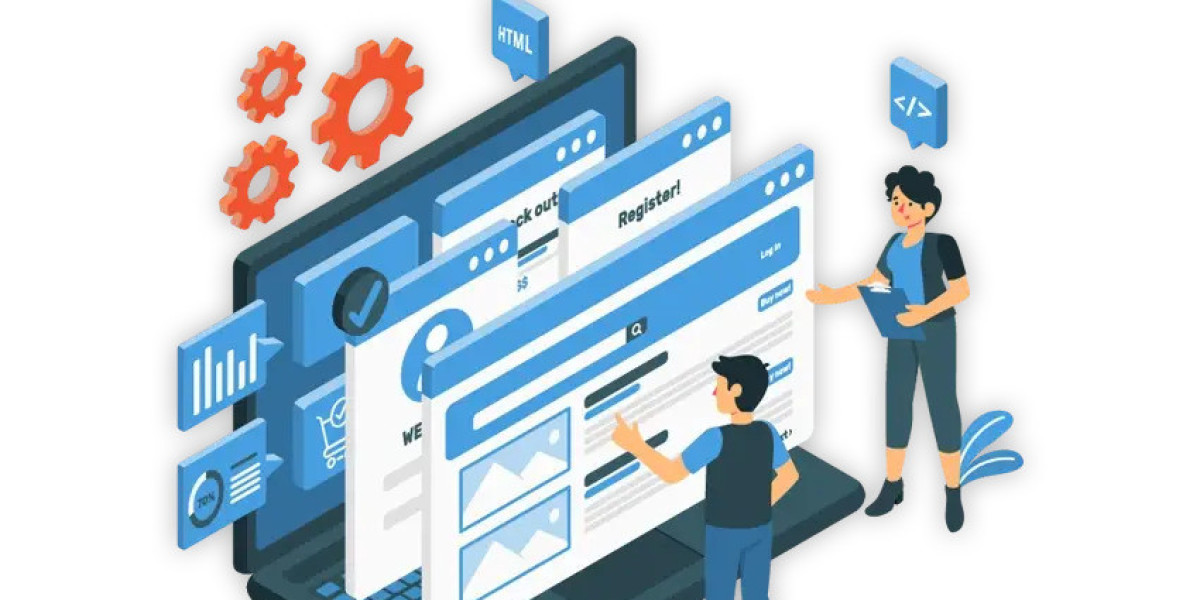Introduction
The healthcare industry in 2025 is no longer just about providing quality treatment. It’s about delivering a seamless digital experience that builds patient trust, enhances communication, and drives measurable results. In an era where patients research before they reach out, your website becomes the first point of connection. A generic, template-based website fails to capture that trust. Healthcare businesses today require custom web design services that reflect credibility, security, and innovation—qualities that templates cannot provide.
The Shift in Digital Expectations
Patients and healthcare consumers are more digitally aware than ever. They expect personalized content, quick access to information, and user-friendly interfaces. A pre-built template limits creativity and scalability, preventing healthcare providers from offering the intuitive experience users now demand. Custom Web Design Services enable the creation of patient-centric portals that address user intent, integrate appointment booking systems, and comply with modern web standards.
In 2025, every healthcare interaction online must feel authentic and secure. A website designed with a cookie-cutter approach risks looking outdated or impersonal, which directly impacts patient confidence. Custom designs, on the other hand, allow brands to stand out while adhering to HIPAA and accessibility standards essential for patient data protection and inclusivity.
Why Template Websites Fall Short
Template websites are designed for mass use, not specialized industries like healthcare. They often come with limitations in structure, security, and functionality. For healthcare organizations, these issues translate to poor user experience and missed engagement opportunities. Templates are rigid and rarely align with evolving brand strategies or the compliance requirements that define the healthcare sector.
Here’s where template websites fail healthcare businesses:
Lack of compliance: Templates may not meet healthcare-specific standards like HIPAA or WCAG accessibility guidelines.
Limited customization: They restrict how medical information, patient portals, or service offerings can be displayed.
Security vulnerabilities: Shared codebases expose sensitive data to higher risks of breaches.
Poor SEO structure: Generic templates often lack technical optimization needed for healthcare search rankings.
No brand differentiation: They make one hospital’s website look similar to another, damaging credibility and trust.
By relying on a template, healthcare businesses risk appearing outdated, losing digital traffic, and missing conversion opportunities.
The Rise of Custom Web Design Services in Healthcare
The healthcare landscape demands trust. Patients expect transparency, and a well-crafted custom website is an extension of that trust. Custom Web Design Services are tailored to create meaningful digital experiences that align with brand values, enhance usability, and improve operational efficiency.
In 2025, hospitals and clinics are increasingly adopting design strategies driven by data, AI, and patient behavior analytics. Custom designs integrate these technologies seamlessly. They allow real-time appointment scheduling, secure telemedicine platforms, and personalized patient dashboards. The result is not just a website, but a functional digital ecosystem that drives engagement and retention.
Moreover, Custom Web Design Services focus on performance optimization—fast loading times, mobile responsiveness, and advanced UI/UX design. These factors not only improve patient experience but also strengthen SEO performance, helping healthcare businesses appear higher in search results when patients seek local or specialized medical services.
The Business Impact of Custom Web Design
A custom website is more than just an aesthetic upgrade. It’s a growth enabler. Healthcare businesses that invest in Custom Web Design Services see measurable returns in lead generation, appointment bookings, and online visibility.
When your digital presence reflects professionalism and care, it sets the tone for patient relationships even before a visit. The design communicates reliability, and the functionality ensures smooth navigation and easy access to medical information.
Key benefits that Custom Web Design brings to healthcare businesses:
Improved user journey with responsive layouts and intuitive navigation.
Integration with CRM and appointment management systems.
Enhanced SEO with structured schema for medical services.
Greater control over branding, messaging, and visuals.
Flexibility to evolve with new healthcare technologies.
With these elements, your website becomes an active marketing asset rather than a static information portal. It supports your digital campaigns, strengthens your brand story, and ensures consistency across all online touchpoints.
The Competitive Edge in 2025
In 2025, healthcare marketing is data-driven, competitive, and experience-focused. Template-based sites cannot keep up with the pace of innovation. A clinic or hospital using a ready-made design will struggle to compete with organizations that use analytics-backed, custom-built digital solutions.
Patients make choices based on perception and convenience. If a website loads slowly or looks identical to a competitor’s, users instantly lose trust. A custom design builds authority, differentiates your brand, and ensures your message resonates with the audience you want to reach. Healthcare businesses that invest in Custom Web Design Services will be better positioned to adapt to changing technologies such as AI chatbots, voice search, and predictive analytics.
Future-Proofing Healthcare with Custom Design
Digital healthcare is evolving beyond websites—it’s about creating connected experiences. Custom Web Design Services enable seamless integration of patient management systems, virtual consultations, and data-driven marketing tools. By customizing these elements, healthcare brands future-proof their digital identity and maintain relevance as patient behavior continues to shift online.
A template locks you into a structure that may not evolve. Custom design evolves with your brand and technology. It provides the foundation for innovation—allowing your digital presence to grow as your healthcare services expand.
Conclusion
Healthcare businesses in 2025 can no longer afford the limitations of template websites. To build trust, enhance user experience, and meet the technical and security expectations of today’s patients, custom design is no longer optional—it’s essential. A website that is uniquely designed for your brand becomes a digital asset that reflects care, competence, and credibility.
We are Pixel Studios, a digital savvy company focused on delivering results. We help our customers embrace digital transformation effortlessly by dissolving their challenges every step of the way. Our perceptive hands-on approach and fine-tuned expertise make a winning combination for unprecedented business transformation that invites growth.














